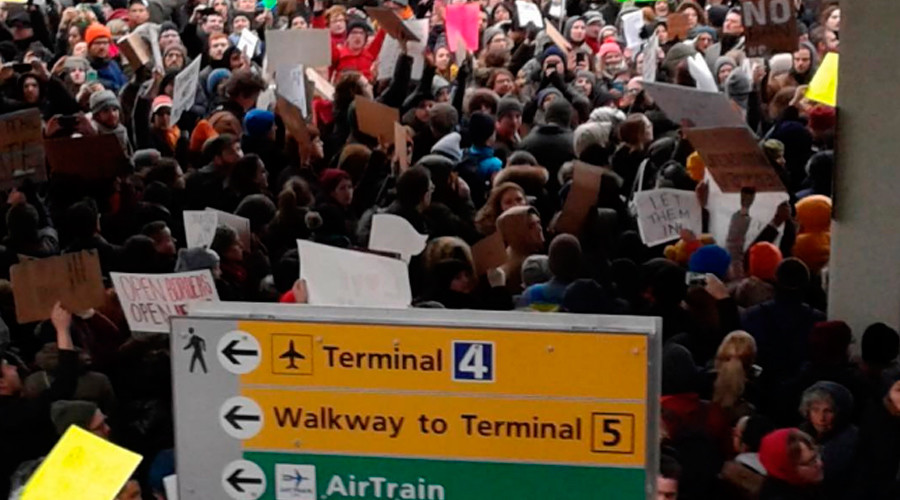One down, 207 to go.
You know the famous statement by pastor Martin Niemöller, who was imprisoned by the Nazis: “First they came for the Socialists and I did not speak out because I was not a Socialist,” and then after the Nazis came for the Trade Unionists, the Jews, and others on their list, they came for him, and “there was no one left to speak out on my behalf.”
Trump seems to have solved the Niemöller problem by going after all of his enemies simultaneously, like some reincarnation of Joe McCarthy, lying and confabulating at will about imagined threats, trying to frighten and intimidate those not immediately targeted into silence and a shamed acquiescence. (Roy Cohn, the consigliere to both McCarthy and the new president, is the obvious link between the two men.)
This has been the most frightening week I have ever lived through in America, worse than 9/11, the assassinations of 1968, Dallas, the Cuban Missile Crisis, what have you. There has been the feeling of our democracy being disemboweled, ripped apart, and shredded, the sinews that have held our country together being severed, with the certain knowledge that this is only the beginning, and with the certain knowledge that putting things back together will be immensely more difficult than pulling them apart. And it is of course not just Trump, it is the chain of failures, in our political parties, in our nominating processes, in our media, in ourselves, that led to the total breakdown of political norms that allowed Trump to seize the White House. Our long national nightmare, to quote Gerald Ford, is only beginning. There has been a not very illuminating debate on whether Trump is lying when he makes absurd accusations such as the one about millions of unregistered votes cast for Hillary in the recent election, and whether, if he sincerely believes what he says to be true, it is really a lie. For Trump, not telling the truth about himself or anyone else, has always been a prerogative of power; he controls his reality, and he can make others accept it; winners shape their reality, and don’t meekly accept other people’s views on what is real or not. And how he is the most powerful person on the planet.
What can I say or advise that you haven’t already heard? Fight back, don’t sit around complaining, or writing posts, don’t mourn, organize. Oppose everything that Trump is for, and if you think you are agreeing with him on anything, think again. Some of this is obvious, such as the horrible immigration and refugee policy he issued yesterday, with its deep resonance of America’s policy towards German Jewish refugees in the 1930s. I stand with the Iraqis and the Libyans, with Sunnis and Shi’ites, with Christians and Jews and Druze and Yazidis.
Some of this is less obvious. If Trump attacks the CIA, I’m a spook; if he attacks NATO, I’m a three-star general; if he attacks Big Pharma, I’m a shameless profiteer. If Trump is opposed to free trade, neoliberalism, with all of its flaws, is looking better and better. If Trump is interested in jobs, I am interested in workers. If Trump is for America First, I am for America, and for the rest of the world, without an ordinal ranking. The enemy of my enemy is usually my friend; any institution that Trump wants to decimate is a potential ally. More broadly, I have become convinced, however much I have been opposed to organizations like the CIA or NATO in the past, the Trumpian alternative will undoubtedly be worse. There has to be a united front against Trump, and the fight against Trump will involve many strange bedfellows, and, my friends, we need to be as promiscuous as possible.
The early signs are promising—The Woman’s March was heartening—500 came out in little Clemson, South Carolina, in the reddest corner of one of the reddest states—and what was most heartening about it is that it was an example of how so-called “identity politics” could and should be inclusive of everyone’s identity. And yesterday, after Trump issued his cruel ukase on Muslim refugees, fluctuated from being a day of deep shame at being an American to one of considerable pride, and a reminder that the rule of law is not yet dead, as long as we fight back. And since, like the president, I am a native of southeastern Queens, I was so heartened to see spontaneous demonstrations erupt in our little corner of the world, at JFK. First, we take over the airports.
The quote that kept coming to mind this week and during yesterdays demonstrations is the famous quotation of Eugene V. Debs, when he was arrested in 1918 for violating the Espionage Act:
While there is a lower class I am in it
While there is a criminal element, I am of it
While there is a man in jail, I am not free
And let me add, “when there is a border closed to anyone, I am a refugee.”
.
